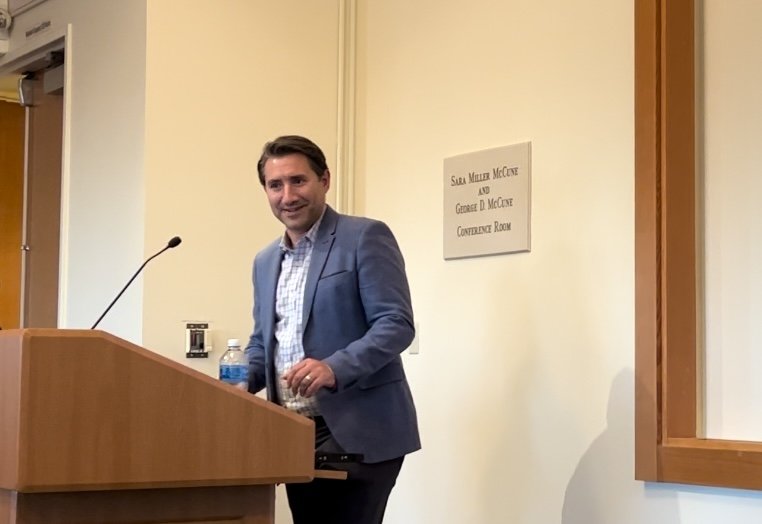By Faith Harvey & Maxwell Wilkens
In the early 20th century, American cinema power-houses like Metro-Goldwyn-Mayer and Fox placed movie theaters in various countries worldwide, from Paris to Brazil. These American cinemas were a window into America, where consumers abroad watched American films, and even ate American snacks such as Nabisco cookies. Films and cinemas became ambassadors for the United States, and increased the country’s global profile.
In an attempt to understand these Hollywood global operations and the political ramifications of these American cinemas, Ross Melnick, a UCSB Film and Media Studies professor and author, did nearly two decades of research which culminated in his new book Hollywood’s Embassies: How Movie Theaters Projected American Power Around the World. Melnick spoke about cinema history and his book at the Interdisciplinary Humanities Center’s second installment of its Humanities Decanted series.
Ross Melnick, a UCSB Film and Media Studies professor, spoke about his latest book Hollywood Embassies: How Movie Theaters Projected American Power Around the World at the Humanities Decanted series held by the IHC.
It was a historical silent film course at UCLA that inspired Melnick to start his research. “I had to follow the lunacy of Hollywood’s regional aesthetics,” he said, describing his research as a region-focused method rather than chronological in approach.
By the time Melnick finished his book, it spanned 36 countries in six regions of the world, covering 90 years of cinema history.
Ross Melnick’s book Hollywood’s Embassies: How Movie Theaters Projected American Power Around The World
The title Hollywood’s Embassies is a play on what cultural embassies mean to us now, Melnick explained. These foreign theaters were a “fully American operations,” he said. The expatriate American managers of these theaters were involved with their respective country's economic or political business. And entertainment went beyond just movies since movie-goers got their news from cinemas historically. “These showcases of short films, news reels, features, and outside marquees were messages that American companies held control in a foreign territory,” Melnick said.
Melnick calls the theaters “exhibitions.” By creating an immersive American experience, this was a creative way to present movies. There was a heavy focus on the physical and social feeling of a cinema house, strengthening the notion of American Imperialism. “They sold Coca-Cola, birthday cake, and showed Tom and Jerry cartoons,” Melnick explained. “The movie goers became temporary American citizens.” The cinemas became childhood memories for consumers, a place to go with friends and families, causing Hollywood to rely on the subconscious wedge created in the minds of the movie watchers.
In the second episode of HFA Speaks: The Podcast, Melnick sat down with UCSB student Maxwell Wilkens to discuss Hollywood Embassies, Melnick’s research, present day cinema distribution via online streaming, and more.
Please click the play button below to listen.
Faith Harvey is a third-year UCSB student, majoring in Communication studies and minoring in Professional Writing. She is a Web and Social Media intern for the Division of Humanities and Fine Arts.
Maxwell Wilkens is a third-year UC Santa Barbara student majoring in Communication and Music Studies. He is a Web and Social Media Intern for the Division of Humanities and Fine Arts.



